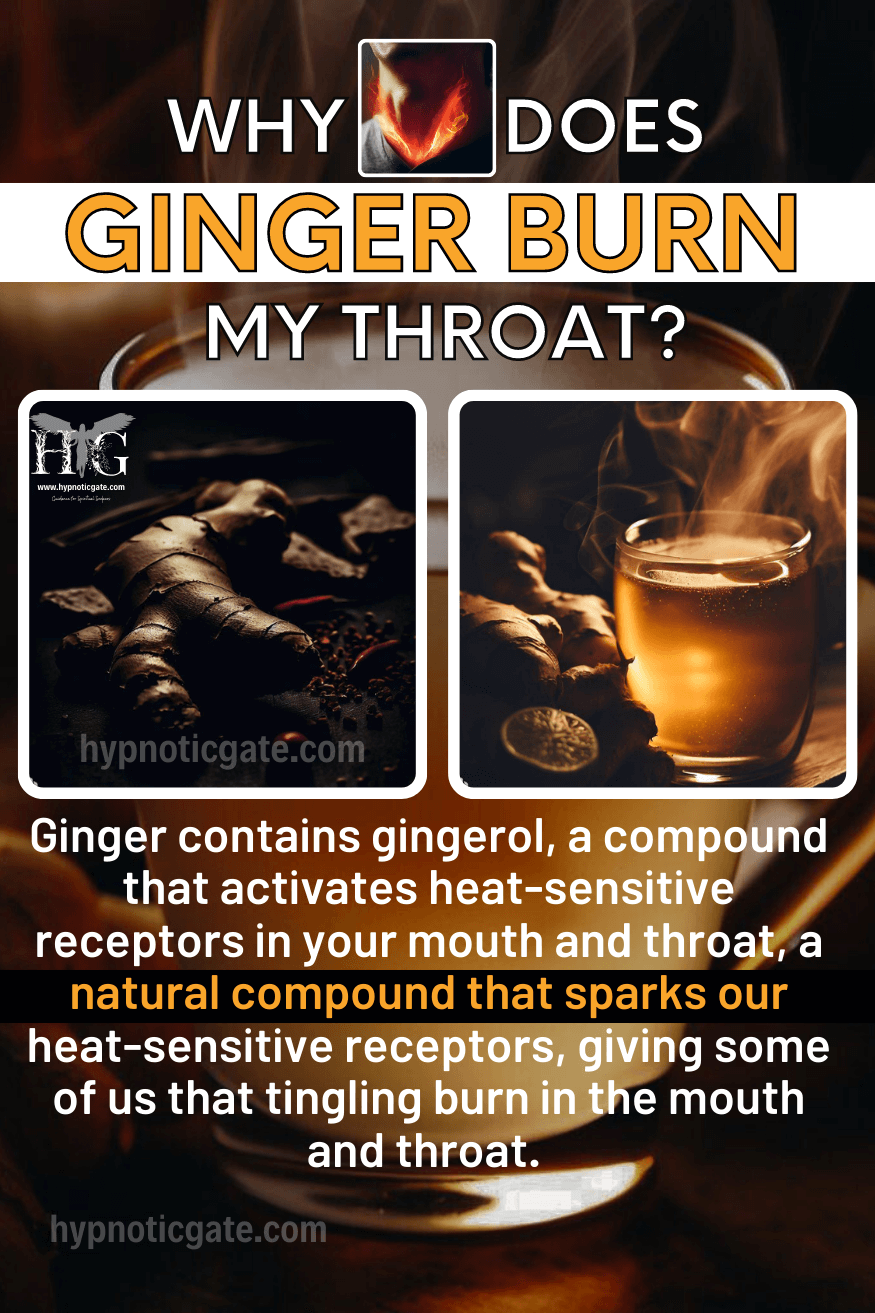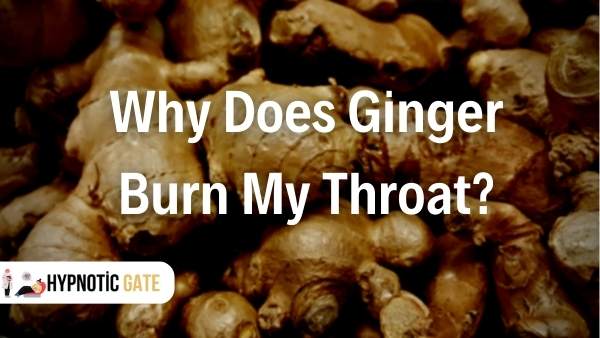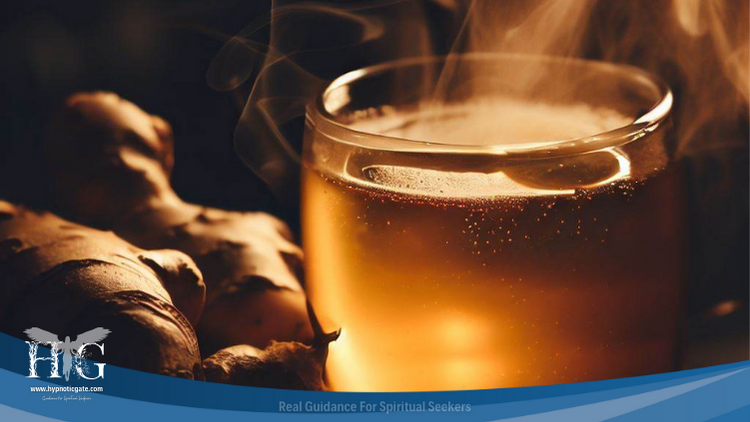
Ginger, celebrated for its bold flavor and aroma, boasts a long history in promoting health. But, for some, it can spur an odd burning feeling in the throat.
The culprit? Gingerol, a ginger compound, that can upset throat receptors. In this piece, we’ll unravel the science of ginger’s zing, probing the reasons and linked factors of this unease. We’ll also look at how ginger eating, gingerol, and throat burning tie together.
The Science Behind Ginger’s Fiery Kick:

Ginger, a famous and potent spice, is bursting with elements that create its unique taste and aroma. Gingerol is one such element. If gingerol connects with special places in your throat, you might feel a hot sensation, often known as “ginger burn”. The strength of this feeling differs. Things like the type of ginger you eat, how much you have, and your personal tolerance can alter it.
| Compound | Found in | Effect on Throat |
|---|---|---|
| Gingerol | Ginger | It can cause a burning sensation |
| Shogaols | Ginger | It may contribute to a burning sensation |
| Paradols | Ginger | It may contribute to a burning sensation |
But the burning sensation caused by gingerol is not a dangerous thing; in fact it’s a natural property of ginger; it can be reduced by the form of ginger consumed or the amount of ginger consumed.
Factors That Affect The Intensity Of The Burning Sensation:
| Factors | Impact on Burning Sensation |
|---|---|
| Form of ginger consumed | The greater amount of ginger consumed may result in more intense burning sensation. |
| Amount of ginger consumed | The greater amount of ginger consumed may result in a more intense burning sensation. |
| Individual tolerance | The greater amount of ginger consumed may result in a more intense burning sensation. |
| Overall health | Overall health can affect the intensity of the burning sensation. |
- Ginger’s form can surely affect how it burns. For instance, raw ginger might burn more than cooked or powdered ones. The amount you eat could also ramp up this burning feeling. More ginger, more burn.
- Your individual tolerance, sensitivity, and overall health all can increase or reduce this feeling. If your throat is on tender side, the burn might be stronger.
Are There Any Factors That Can Affect the Intensity of the Burning Sensation When Consuming Ginger?
Eating ginger can sometimes cause a fiery feeling. What affects this? Well, it could be the kind of ginger you eat. Is it raw? Cooked? Powdered? The amount you eat matters too. Think about how spicy food affects people differently. That’s how it is with ginger. Your tolerance and overall health factor into it too. In a nutshell, the heat you feel from ginger depends on the form you eat, how much you eat, and your health and tolerance.
How Does Ginger Consumption Compare To Other Spicy Or Pungent Foods In Terms Of Causing A Burning Sensation In The Throat?
Ginger’s spicy twang is much like other zingy foods; it can cause a throat tingle. Its burn level? Moderate to strong. Another strong throat burner? Chili peppers and wasabi, thanks to capsaicin. Mustard and horseradish, on the other hand, bring a softer burn, mild to moderate. Black pepper, it’s on the mild side.
| Food | Burning Sensation |
|---|---|
| Ginger | Moderate to High |
| Capsaicin (found in chili peppers) | High |
| Wasabi | High |
| Mustard | Low to Moderate |
| Horseradish | Low to Moderate |
| Black Pepper | Low |
How Can I Continue To Enjoy The Benefits Of Ginger Without Discomfort?
- Incorporating ginger into fruit smoothies or juices
- Consuming ginger with water to dilute the burning sensation
- Using natural sweeteners such as stevia to counteract the burning sensation
- Mixing ginger with other herbs and spices to reduce the burning sensation
- Gradually increasing ginger consumption to build tolerance
- Consuming ginger supplements or ginger tea( we talked about)
- Cooking ginger before consumption
How to Reduce the Burning Sensation?
- To mitigate the burning sensation when consuming ginger, try cooking it before eating or pairing it with other foods and drinks.
- Other ways to incorporate ginger into your diet without the burning sensation include ginger supplements or ginger tea. –
- Another tip is to start with small amounts and gradually increase the amount consumed to test individual tolerance.
- Another solution can be to mix ginger with other spices or herbs to reduce the burning sensation.
Does Ginger Burn a Sore Throat?
Ginger is pretty neat stuff(worth a try). It’s good for a pesky sore throat. Since it’s got stuff in it that fights swelling, it can calm down your sore throat and make it feel warm and soothed. It also fights off germs that could lead to infection. Ginger for a sore throat is a great idea. It can really do the job, bringing amazing relief!
Can I Drink Ginger 3 Times A Day?
Despite its many upsides, ginger should be taken moderately. While it’s often suggested to drink ginger thrice daily for easing muscle pain, making it a part of your everyday diet for some time is a better approach. Overdoing it may lead to an uneasy tummy or other discomforts.
Why does ginger burn my chest?
Wow, did you know ginger could lead to a fiery feeling in your chest? How? Well, it’s because of natural irritants and some stuff called “gingerols” and “shogaols”. Trouble is, eating a lot may create some inflammation in certain folks. So, watch how much ginger you are eating to keep discomfort at bay.
How Much Ginger is Too Much?
| Dosage (per day) | Potential effects |
|---|---|
| 2-4 grams (1-2 teaspoons) of powdered ginger | Considered safe for most people, it may provide health benefits |
| 4-6 grams (2-3 teaspoons) of powdered ginger | Generally safe, but may cause stomach upset or diarrhea in some individuals |
| 6-8 grams (3-4 teaspoons) of powdered ginger | It is not recommended. It may cause more severe stomach upset, diarrhea, and other side effects. |
| More than 8 grams of powdered ginger | It is not recommended, it may cause more severe stomach upset, diarrhea, and other side effects. |
Too Much Ginger Side Effects
| Benefits | Side Effects |
|---|---|
| Anti-inflammatory | Stomach upset, diarrhea |
| Anti-nausea | Heartburn, indigestion |
| Pain relief | Mouth and throat irritation |
| Blood sugar control | Low blood sugar (hypoglycemia) in people taking diabetes medication |
| Cardiovascular health benefits | Blood thinning (increase the risk of bleeding) |
Conclusion
Try it with different meals or beverages. Or, you could have ginger as a pill or drink it as tea to sidestep the fiery feel. Starting with a small dose and slowly building up is also a good idea to assess your personal response. Blending ginger with other herbs or spices can assist in lessening the fiery kick.

